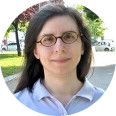
VAITSA GIANNOULI
Postdoctoral Researcher,
Aristotle University of Thessaloniki
2022–2023 Fulbright Greek Scholar to the U.S. Host: Wayne State University, Institute of Gerontology, Detroit, Michigan
Gerontology is a new term that combines the two Greek words “λογία” (study of) and “γέροντος” (old man). Gerontology examines the aging process in humans by focusing on the biological, cognitive, psychological-emotional, social, and cultural aspects of aging. This multidisciplinary approach in research and clinical practice involves the collaboration and exchange of knowledge between scientists from different fields, such as psychologists, physicians, biologists, nurses, sociologists, anthropologists, social workers, occupational therapists, and political scientists, who work with older adults (healthy older individuals as well as older patients suffering from neurocognitive disorders and/or other health problems).
Gerontology is becoming more important than ever, as during the last decade there has been a dramatic increase in the world’s older population—individuals aged 65 years and over. These individuals face challenges and may need care and protection as community-dwelling older adults or as patients in hospitals, hospices, and assisted-care facilities. Social gerontology and biogerontology are two of the most well-known subfields of gerontology, with the former dealing with the social aspects of aging and the latter with the biological aspects.
Although in the U.S. and Europe there are a plethora of programs and degrees (majors and minors) in gerontology, in Greece there are only a few universities with undergraduate courses (no degrees so far!) that provide students with relevant basic knowledge. Therefore, those who wish to get training in gerontology must follow postgraduate programs. Of course, this should not be considered as an obstacle for a scientist interested in old age (and who does not suffer from fear of old age, known as gerascophobia), because as Marie Curie said, “Nothing in life is to be feared; it is only to be understood.”
Photo Credit: Matt Bennett for Unsplash

